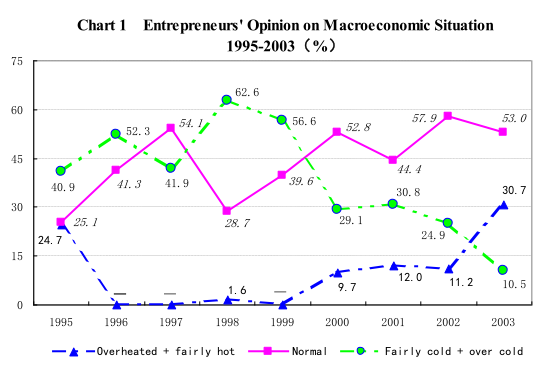Entrepreneurs’ Opinion on the Macroeconomic Situation and the Hot Spots of Reform -- The 2003 Report on the Survey of Chinese Entrepreneurs
2004-03-12
The Entrepreneurs Survey System of the Talents Center
The 2003 Questionnaire Survey on Chinese Entrepreneurs was conducted by the Chinese Entrepreneurs Survey System of the Personnel Exchange and Training Center of the State Council Development Research Center. A total of 10,000 copies of the questionnaire were issued in August 2003, of which 3,192 valid copies were received and covered various types of enterprises in China’s 31 provinces, autonomous regions and the municipalities directly under the central government. The state-owned and non-state-owned enterprises respectively accounted for 26.1 percent and 73.9 percent of those surveyed. In terms of size, the large, medium-sized and small enterprises respectively accounted for 21.2 percent, 50.2 percent and 28.6 percent. And in terms of position, board chairmen or general managers, factory leaders and party secretaries together accounted for 95.3 percent. This report represents a comprehensive summary of the judgments and suggestions the entrepreneurs made in the survey about the macroeconomic situation and the hot spots of reform in the year.
I. Macroeconomic Trend Is Clearly Heating
The survey indicates that in judging the current macroeconomic situation, 30.7 percent of the surveyed entrepreneurs believed it was fairly "hot" (28.1 percent of them said it was "fairly hot", whereas 2.6 percent said it was "overheated"). This proportion was nearly 20 percentage points higher than that of the previous year and the highest since the survey began in 1995. Whereas more than half of the surveyed entrepreneurs (53 percent) believed that the economic situation was "normal", about one-tenth (10.5 percent) believed it was "fairly cold" or "over cold", which was 15 percentage points lower than that of the previous year and the lowest since 1995 (Chart 1).

1. Investment growth was robust, export continued to rise and inadequate consumption eased
In terms of investment demand, the survey indicates that more than half of the surveyed entrepreneurs believed both governmental and non-governmental investment demands were "very strong" or "fairly strong". They were respectively 11 and 19 percentage points higher than that of 2002. The proportion of those who believe investment demands were "appropriate" was roughly the same as that of the previous year whereas those who believe the demands were "inadequate" were respectively 9 and 20 percentage points less than that of 2002.
In terms of consumer demand, the survey indicates that 23.1 percent of entrepreneurs believed that the demand was "fairly strong" or "very strong", which was 8.6 percentage points over that of the previous year. Whereas 30.8 percent of the entrepreneurs surveyed, believed that the demand was "appropriate", which was 6 percentage points higher than that of the previous year and 46.7 percent believed the consumer demand was "inadequate" or "seriously inadequate", which was 14.7 percentage points less than that of the previous year.
When it came to foreign trade export demand, the survey indicates that 32.4 percent of entrepreneurs believed the demand was "fairly strong" or "very strong", which was 13.9 percentage points higher than that of 2002. Whereas 28.2 percent of the entrepreneurs believed the demand was "appropriate", which was 6.8 percentage points higher than that of the previous year 39.4 percent of the entrepreneurs believed the demand was "inadequate" or "seriously inadequate", which was 20.7 percentage points less than that of the previous year.
2. The impact of the SARS epidemic was limited, and the WTO accession helped increase corporate competitiveness
The survey indicates that 32.3 percent of entrepreneurs believed the epidemic had "no impact" on the operations of their enterprises. This proportion was 25 percentage points higher than in the survey on the epidemic’s impact on enterprises conducted in early June by the China Entrepreneurs Survey System. Whereas 11 percent of the entrepreneurs surveyed believed the epidemic had "positive impact" on enterprises, 56.7 percent believed it had "negative impact". However, only 30.7 percent of the entrepreneurs believed the negative impact was "very serious" or "fairly serious", which was 20 percentage points less than that of the June survey. In terms of foreign orders, only 10.6 percent entrepreneurs believed that foreign business people failed to perform the placed order contracts or transferred them to other places.
With regard to the impact of the WTO accession on enterprises, the survey indicates that three-fourths of entrepreneurs believed that "competition is exacerbated". This proportion was far higher than that of other options. Next, 42.9 percent of the entrepreneurs selected "technology upgrading", and one-fourth selected "scale expansion". In addition, 20.1 percent of the entrepreneurs selected "increased varieties" in products (services), and 15.6 percent selected "increased export". In the meantime, about 19 percent of the entrepreneurs selected "brain drain" and "lower efficiency". Therefore, the impact of the WTO accession on enterprises was primarily positive. The accession increased the competition pressure on enterprises, and promoted their technology upgrading, scale expansion and product restructuring, thus further promoting the upgrading of the industrial structure and the advancement of marketization across the country.
…
If you need the full text, please leave a message on the website.














